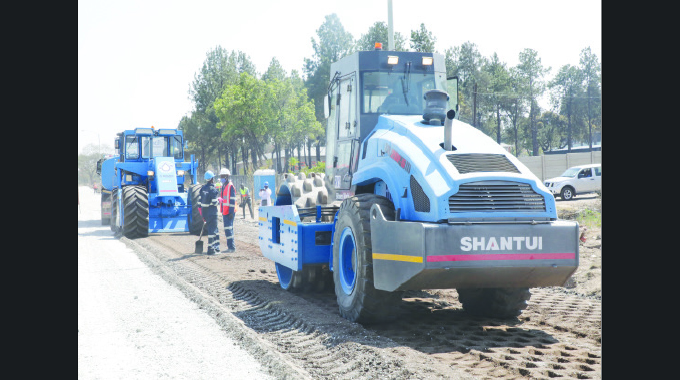EDITORIAL COMMENT: Infrastructure development now being done properly

Progress continues to be made in upgrading basic infrastructure and services in Zimbabwe with the 100-day cycles that come under Cabinet scrutiny making sure that no one is falling behind or substituting words for deeds.
One of the most significant transport projects nationally is the Karoi-Binga Road, replacing what was little more than a track suitable for four-wheel-drive vehicle with a powerful engine, and then only if had not been raining recently, with a decent road that will finally put in the long-required highway across the north of Zimbabwe.
It has always been a bit odd that much of the road traffic coming from the Mashonaland Provinces and Harare had to go via Bulawayo to reach Hwange and the rest of Matabeleland North.
The area was one of those left behind, but the Second Republic has dusted off the plans, some of which go right back to colonial times, and is building the proper modern road with the next US$10 million tranche of cash now released.
But even more important than the needed northern connection between the two halves of Zimbabwe, is the benefits it brings to the “left behind” in some of the poorest parts of the country.
At long last they can join in the economic progress the rest of us are now starting to see. One minor benefit that has already appeared is a halving of bus fares on the completed section of the highway.
In Harare we are seeing significant progress. The work on rebuilding Seke Road is progressing ahead of schedule. This goes beyond repairing what was there, which was basically a suburban road converted into a major highway without the required rebuild.
Harare City Council started off badly, skimping on the costs of putting in a proper roadbed that could cope with heavy traffic, it then continued badly by ignoring the road.
The emergency work now in progress, under Government contracts rather than on municipal contracts, should have been done by the council years ago. Central Government had to step in here as in many other places in Harare and other cities and fix things, but at least they are being fixed properly, not just patched and everyone hoping for the best until the next rains washed out the patches. One development in Harare being brought to the fore is the interchange, the technical word for what most people think of as a flyover, to replace the Mbudzi roundabout.
The interchange is vitally needed as while traffic flows at the roundabout can be improved, the amount of traffic there with three major roads leading into it is too great for any upgrade of existing infrastructure.
The interchange is being, in effect, included in the final stage of the major work being done on upgrading and rebuilding the Harare-Masvingo-Beitbridge highway. This is because that particular point is the major choke point on this highway with almost continuous national traffic intersecting with almost continuous major local traffic.
Of course, the Ministry of Transport and Infrastructure Development is having to operate under the new Second Republic rules. The Ministry of Finance and Economic Development is prepared, on this particular bit of infrastructure, to allow borrowing to bring forward the work. But under our strict fiscal discipline and prudent financial rules it has insisted on seeing a practical and realistic proposal linking a guaranteed revenue stream to the loans so that they will be paid back, on time.
The Transport Ministry, rather ruefully, has noted that it had to take back the original proposal, fill in the gaps and resubmit.
The one advantage of that was that it appears to been able to include the critical interchange. The transport experts reckon that this time the financial mandarins will give the go ahead. This work, combined with the Seke Road work, will suddenly give Harare rather good communications with all points south, from Chitungwiza onwards.
Considering how much time is wasted, how many hours of valuable use of trucks and other vehicles is lost, and how much damage vehicles see when going south, the whole pair of projects seem a major bargain.
Another piece of new infrastructure this time comes from the private sector. Gweru City Council, lacking money, made a deal with a private developer to do something about the Kudzanai bus terminus in the city.
The private developer went far beyond just rebuilding the area and is now managing the terminus.
It has put in the necessary bits and pieces for a modern terminus, starting with signposting each route, banning touts, putting in its own uniformed staff and even registering the pushcart operators so that passengers can hand over their luggage without worrying whether they will ever see it again. All of this seems fairly obvious, regardless of how much construction may or may not have been needed. But most terminuses in Zimbabwe are not managed properly although Zupco is starting to lean on some of the cowboys and get some basic improvements in management in place, but a lot more needs to be done, preferably by people, as was the case in Gweru, who start off with the passengers and what they need rather than treating public transport users as second rate citizens.
The Government itself does not. This week has not only seen the start of properly planned and integrated train-bus services, but also the commissioning yesterday of the sixth batch of new buses for Zupco services.
President Mnangagwa went down to commission personally the batch of 50, which are largely reserved for urban routes and with the previous five batches bring up the Golden Dragon fleet to more than 400 buses.
Again this is the continuous progress we need. You start off with looking at what you want and then every month you put in the next set of bits, but they all fit because there was a sensible plan to start with.
Even the emergency work being done on roads and the like fits into the final plan, so that more and more it becomes quite ordinary to do things properly the first time round.










Comments